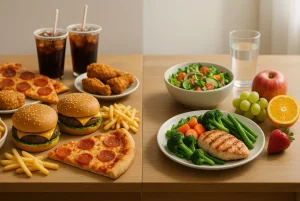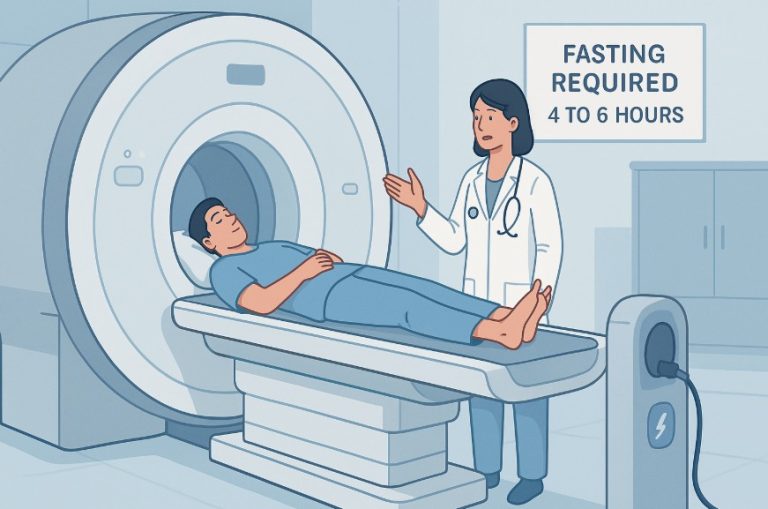Many people start their weight loss journey with determination cutting calories, joining a gym, and setting clear goals. Yet, despite weeks or even months of consistent effort, the scale does not always show the results expected. This leads to frustration and the common question: Why am I not losing weight when I exercise and diet?
The truth is that weight management is not as simple as “eat less and move more.” While energy balance is at the core of fat loss, a wide range of factors influence whether the body actually responds. From hidden calories and sleep quality to medical conditions and hormonal fluctuations, multiple elements can interfere with progress.
To better understand this challenge, let us explore the top 10 reasons people often struggle to lose weight despite exercise and dieting.
What are the top 10 reasons you are not losing weight despite exercising and dieting?
Weight loss is rarely straightforward. Below are ten of the most common reasons progress may stall, each of which can make the journey more complex than expected.
1. Calorie intake may still be too high

The most fundamental principle of weight loss is creating a calorie deficit. Yet, many unknowingly consume more than they burn. Portion sizes, hidden calories in sauces or drinks, and underestimating “healthy snacks” often contribute to this issue.
For instance, adding mayonnaise to a sandwich, a latte with flavoured syrup, or a handful of mixed nuts can easily contribute several hundred extra calories. Over the course of a week, these small additions accumulate enough to block progress.
The solution is not extreme restriction but awareness. Tracking meals, weighing portions, or keeping a food diary helps ensure intake truly matches goals.
Even modest adjustments, such as reducing liquid calories or measuring cooking oils, can reignite weight loss.
2. Exercise intensity and duration might not be enough

Physical activity supports fat loss, but the quality of exercise matters as much as the quantity. Many people engage in workouts that are too light or too short to create a meaningful calorie burn.
A casual 15-minute cycle may improve health but may not make a significant difference in energy expenditure.
Equally, repeating the same routine over and over allows the body to adapt, reducing its impact. To overcome this, workouts should be challenging enough to raise heart rate, increase endurance, and stimulate muscle growth.
This does not necessarily mean extreme training every day, but progressively increasing either the intensity, resistance, or duration of sessions helps sustain progress.
3. Muscle gain can disguise fat loss

One of the most overlooked factors is that the scale does not differentiate between fat, muscle, and water weight.
As someone begins strength training, muscle mass increases. Muscle is denser than fat, meaning the scale may remain stable or even rise slightly despite fat being lost.
For example, an individual may notice that clothing fits better, their body feels firmer, and their energy improves, even if their weight remains unchanged.
This reflects positive progress that a scale alone cannot capture. Tracking body measurements, progress photos, or performance improvements in the gym provides a far clearer picture than weight alone.
4. Underlying Medical Conditions Can Interfere

Certain medical conditions can make fat loss far more challenging, even with consistent diet and exercise.
Hypothyroidism, for instance, slows metabolism, while polycystic ovary syndrome (PCOS) can disrupt hormones that regulate weight. Insulin resistance also affects how the body stores and utilises energy.
In these cases, simply reducing calories further often does not solve the problem. Instead, professional medical support is required. Blood tests, proper diagnosis, and treatment are crucial.
This does not mean weight loss is impossible, but it does mean the approach must be tailored to individual circumstances.
5. Medications May Influence Weight

Alongside medical conditions, certain medications are known to influence weight. Antidepressants, corticosteroids, beta-blockers, and even some diabetes treatments can cause either weight gain or slow down fat loss.
This does not mean these medications should be stopped without guidance health always comes first. However, if someone suspects their medication is interfering with weight loss, it is worth speaking to their doctor.
Sometimes alternative options or dosage adjustments are available that support both health and weight goals.
6. Hormonal Imbalances Affect Metabolism

Hormones play a central role in regulating metabolism, appetite, and fat storage. Imbalances can create significant barriers to weight loss. For example:
- Cortisol, known as the stress hormone, encourages fat storage, particularly around the abdomen.
- Thyroid hormones regulate energy expenditure, and low levels can slow metabolism.
- Insulin influences how the body stores glucose and fat, and resistance can lead to weight gain.
When hormones are out of balance, even strict diets and intense workouts may not yield results.
Addressing lifestyle factors such as stress management, proper sleep, and medical support when necessary can help restore balance and allow weight loss to resume.
7. Lack of Quality Sleep Increases Appetite

Sleep is often underestimated in weight loss. Yet, inadequate rest directly disrupts hunger-regulating hormones ghrelin, which increases appetite, and leptin, which signals fullness.
A person consistently sleeping only five hours per night is far more likely to crave high-calorie, sugary foods than someone getting a full eight hours.
Beyond cravings, poor sleep also reduces energy levels, making workouts feel harder and recovery slower.
Over time, this creates a cycle where fatigue leads to less activity and increased snacking. Prioritising seven to nine hours of quality sleep supports metabolism, appetite control, and exercise performance.
8. Dietary Habits May Not Be Balanced

Even when calorie intake is under control, poor food quality may still prevent fat loss. Diets high in processed foods, refined sugars, and unhealthy fats can trigger energy crashes, cravings, and overeating.
For example, a meal of fast food may fit within a calorie target but provide little nutrition or satiety, leaving someone hungry again within hours.
In contrast, a balanced plate with lean protein, vegetables, and whole grains not only supports fat loss but also boosts overall health.
Sustainable weight loss comes not from short-term restrictions but from building a diet centred on whole, nutrient-rich foods.
9. Hitting a Weight Loss Plateau Is Normal

Almost everyone experiences a plateau at some point. After initial progress, weight loss slows or stalls, even though nothing has changed. This happens because the body adapts to lower energy intake and weight.
At a smaller body size, fewer calories are required to maintain function, so the original calorie deficit is no longer effective.
Breaking through a plateau may involve adjusting exercise routines, slightly reducing calorie intake further, or incorporating resistance training to build more muscle.
In some cases, a short maintenance period where calories are temporarily increased helps reset metabolism before resuming fat loss efforts.
10. Stress Can Sabotage Progress

Stress affects more than just mood. Chronic stress raises cortisol, which encourages fat storage and increases cravings for comfort foods high in sugar and fat. Long-term stress also interferes with sleep, creating a double barrier to weight loss.
Managing stress is therefore not simply a wellbeing strategy it is a weight management tool. Practices such as meditation, yoga, journaling, or even regular leisure activities can help reduce cortisol levels. By addressing stress directly, the body is more likely to respond positively to diet and exercise.
What practical solutions can help overcome these barriers?
The table below summarises the main reasons weight loss stalls and some strategies to address them:
| Reason | Why It Happens | Solution |
| Calorie intake | Underestimating portions, hidden extras | Track intake carefully, measure portions |
| Low exercise intensity | Not burning enough calories | Increase workout duration or intensity |
| Muscle gain | Fat loss masked by muscle growth | Track measurements, progress photos |
| Medical conditions | Hormonal/metabolic interference | Consult a GP, seek medical guidance |
| Medications | Certain drugs affect weight | Discuss alternatives with a healthcare provider |
| Hormonal imbalances | Cortisol, thyroid, or insulin disruption | Manage stress, test hormones, seek treatment |
| Poor sleep | Appetite hormones disrupted | Prioritise 7–9 hours of quality rest |
| Poor dietary habits | Too much processed food | Focus on whole, nutrient-dense meals |
| Plateau | Body adapts to lower energy intake | Adjust calories, vary workouts |
| Stress | Emotional eating, high cortisol | Stress management techniques, relaxation |
How can progress be measured beyond the scale?
It is important to remember that scales only show one part of the story. Many people lose inches, gain strength, and feel healthier long before their weight changes significantly. Measuring progress in multiple ways prevents frustration and provides a more accurate picture.
Some alternatives include tracking waist circumference, using clothing fit as a guide, monitoring improvements in exercise performance, or simply observing increases in daily energy. These non-scale victories often reflect more meaningful and sustainable improvements.
Conclusion
Not losing weight despite dieting and exercising is a common challenge, but it rarely means failure. Often, the cause lies in factors beyond simple calorie counting such as sleep, stress, hormonal imbalances, or medical conditions. Recognising these barriers is the first step towards overcoming them.
Weight loss is best viewed as a long-term journey rather than a quick fix. Patience, consistency, and a willingness to adjust habits are key. By addressing each of the possible obstacles from hidden calories to lifestyle stressors anyone can create a more effective, sustainable path to reaching their goals.
FAQs
Can muscle gain make it look like someone is not losing weight?
Yes. Muscle is denser than fat, so the scale may remain unchanged even though body composition is improving.
How long does it usually take to see noticeable weight loss?
Most people begin to see results within 4 to 6 weeks, although the timeline varies depending on diet, exercise, and individual factors.
Can eating too few calories stop weight loss?
Extremely low-calorie diets slow metabolism, increase fatigue, and often lead to overeating, preventing sustainable fat loss.
How much exercise is generally recommended for fat loss?
A mix of 150 minutes of moderate cardio per week and two or more strength training sessions works well for most people.
Can stress management techniques actually help with weight loss?
Yes. Reducing stress lowers cortisol, improves sleep, and helps prevent overeating triggered by emotional responses.
How does water retention affect progress?
Water retention caused by high salt intake, hormonal changes, or stress can mask fat loss, making it seem as though progress has stalled.
Should medical advice be sought if weight loss stalls for a long time?
Yes. If consistent effort over several months shows no results, consulting a healthcare professional is important to rule out underlying issues.
READ NEXT:






